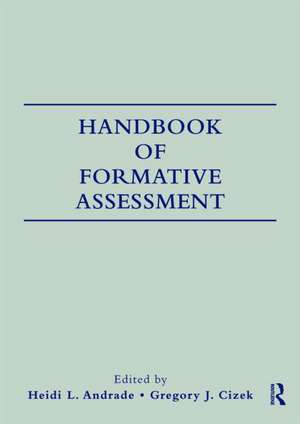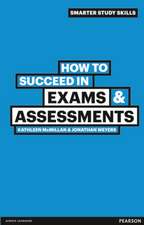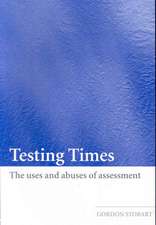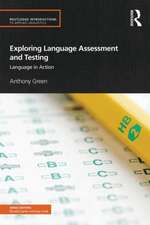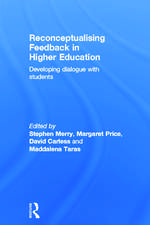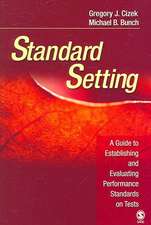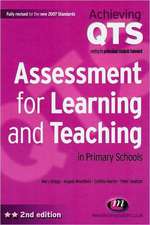Handbook of Formative Assessment
Editat de Heidi L. Andrade, Gregory J. Cizeken Limba Engleză Paperback – 2 noi 2009
Key features include:
- Comprehensive – nineteen chapters cover all aspects of formative assessment including classroom assessment, large-scale applications, technological applications, applications for special needs students, K-12 and post-secondary applications, psychometric considerations, case studies, and discussion of alternative assessment formats such as portfolios and performance assessments.
- Integrative – thoughtful attention is given to the integration of large-scale and classroom assessments.
- Practical – provides practical guidance on how to conduct formative assessments that generate credible information to guide instruction.
- Global – provides perspectives from leading international scholars and practitioners whose expertise spans diverse settings, student populations, and educational systems.
- Accessible Style – although grounded in the latest research, the book’s style and tone has been carefully crafted to make it accessible to both the textbook and professional markets. It will also be a critical reference book for researchers in teacher preparation, educational administration, and educational policy studies.
| Toate formatele și edițiile | Preț | Express |
|---|---|---|
| Paperback (1) | 845.60 lei 6-8 săpt. | |
| Taylor & Francis – 2 noi 2009 | 845.60 lei 6-8 săpt. | |
| Hardback (1) | 1939.44 lei 6-8 săpt. | |
| Taylor & Francis – 2 noi 2009 | 1939.44 lei 6-8 săpt. |
Preț: 845.60 lei
Preț vechi: 1031.22 lei
-18% Nou
Puncte Express: 1268
Preț estimativ în valută:
161.81€ • 169.37$ • 134.67£
161.81€ • 169.37$ • 134.67£
Carte tipărită la comandă
Livrare economică 31 martie-14 aprilie
Preluare comenzi: 021 569.72.76
Specificații
ISBN-13: 9780415993203
ISBN-10: 0415993202
Pagini: 392
Ilustrații: 18 tables and 34 line drawings
Dimensiuni: 174 x 246 x 23 mm
Greutate: 0.7 kg
Ediția:1
Editura: Taylor & Francis
Colecția Routledge
Locul publicării:Oxford, United Kingdom
ISBN-10: 0415993202
Pagini: 392
Ilustrații: 18 tables and 34 line drawings
Dimensiuni: 174 x 246 x 23 mm
Greutate: 0.7 kg
Ediția:1
Editura: Taylor & Francis
Colecția Routledge
Locul publicării:Oxford, United Kingdom
Cuprins
Preface
Section I. Foundations of Formative Assessment
1. An Introduction to Formative Assessment: History, Characteristics, and Challenges, Gregory J. Cizek
2. An Integrative Summary of the Research Literature and Implications for a New Theory of Formative Assessment, Dylan Wiliam
3. The Practical Implications of Educational Aims and Contexts for Formative Assessment, James McMillan
Section II. Formative Assessment Methods and Practice
4. Peers as a Source of Formative Assessment, Keith J. Topping
5. Formative Assessment Applications of Culminating Demonstrations of Mastery, Jill Davidson and Jay Feldman
6. Students as the Definitive Source of Formative Assessment: Academic Self-Assessment and the Self-Regulation of Learning, Heidi L. Andrade
7. Formative Assessment: The Contribution of Benjamin S. Bloom, Thomas R. Guskey
8. Technology-Aided Formative Assessment of Learning: New Developments and Applications, Michael K. Russell
9. Formative Assessment, Motivation, and Science Learning, Maria Araceli Ruiz-Primo, Erin Marie Furtak, Carlos Ayala, Yue Yin, and Richard J. Shavelson
10. Research and Strategies for Adapting Formative Assessment for Students with Special Needs, Stephen N. Elliott, Ryan J. Kettler, Peter A. Beddow, and Alexander Kurz
11. Research and Recommendations for Formative Assessment with English Language Learners, Jamal Abedi
12. Moment-by-moment Formative Assessment of Second Language Development: ESOL Professionals at Work, Carla Meskill
13. Formative Assessment Practices that Maximize Learning for Students At-Risk, Gerunda B. Hughes
14. Essential Formative Assessment Competencies for Teachers and School Leaders, Rick Stiggins
15. Research on Characteristics of Effective Professional Development Programs for Enhancing Educators’ Skills in Formative Assessment, M. Christina Schneider and Bruce Randel
Section III: Challenges and Future Directions for Formative Assessment
16. Mixing It Up: Combining Sources of Classroom Achievement Information for Formative and Summative Purposes, Susan M. Brookhart
17. Psychometric Challenges and Opportunities in Implementing Formative Assessment, Walter D. Way, Robert P. Dolan, and Paul Nichols
18. Strategies and Policies for Incorporating Formative Assessment into Comprehensive and Balanced State Assessment Systems, Doug A. Rindone and Duncan MacQuarrie
19. Keeping the Focus, Expanding the Vision, Maintaining the Balance: Preserving and Enhancing Formative Assessment in Nebraska, Chris W. Gallagher
20. Summing Up and Moving Forward: Key Challenges and Future Directions for Research and Development in Formative Assessment, Heidi L. Andrade
About the Authors
Author Index
Subject Index
Section I. Foundations of Formative Assessment
1. An Introduction to Formative Assessment: History, Characteristics, and Challenges, Gregory J. Cizek
2. An Integrative Summary of the Research Literature and Implications for a New Theory of Formative Assessment, Dylan Wiliam
3. The Practical Implications of Educational Aims and Contexts for Formative Assessment, James McMillan
Section II. Formative Assessment Methods and Practice
4. Peers as a Source of Formative Assessment, Keith J. Topping
5. Formative Assessment Applications of Culminating Demonstrations of Mastery, Jill Davidson and Jay Feldman
6. Students as the Definitive Source of Formative Assessment: Academic Self-Assessment and the Self-Regulation of Learning, Heidi L. Andrade
7. Formative Assessment: The Contribution of Benjamin S. Bloom, Thomas R. Guskey
8. Technology-Aided Formative Assessment of Learning: New Developments and Applications, Michael K. Russell
9. Formative Assessment, Motivation, and Science Learning, Maria Araceli Ruiz-Primo, Erin Marie Furtak, Carlos Ayala, Yue Yin, and Richard J. Shavelson
10. Research and Strategies for Adapting Formative Assessment for Students with Special Needs, Stephen N. Elliott, Ryan J. Kettler, Peter A. Beddow, and Alexander Kurz
11. Research and Recommendations for Formative Assessment with English Language Learners, Jamal Abedi
12. Moment-by-moment Formative Assessment of Second Language Development: ESOL Professionals at Work, Carla Meskill
13. Formative Assessment Practices that Maximize Learning for Students At-Risk, Gerunda B. Hughes
14. Essential Formative Assessment Competencies for Teachers and School Leaders, Rick Stiggins
15. Research on Characteristics of Effective Professional Development Programs for Enhancing Educators’ Skills in Formative Assessment, M. Christina Schneider and Bruce Randel
Section III: Challenges and Future Directions for Formative Assessment
16. Mixing It Up: Combining Sources of Classroom Achievement Information for Formative and Summative Purposes, Susan M. Brookhart
17. Psychometric Challenges and Opportunities in Implementing Formative Assessment, Walter D. Way, Robert P. Dolan, and Paul Nichols
18. Strategies and Policies for Incorporating Formative Assessment into Comprehensive and Balanced State Assessment Systems, Doug A. Rindone and Duncan MacQuarrie
19. Keeping the Focus, Expanding the Vision, Maintaining the Balance: Preserving and Enhancing Formative Assessment in Nebraska, Chris W. Gallagher
20. Summing Up and Moving Forward: Key Challenges and Future Directions for Research and Development in Formative Assessment, Heidi L. Andrade
About the Authors
Author Index
Subject Index
Recenzii
"This compilation of robustly researched, authoritative, well crafted and accessible studies…are drawn from the gaze of 31 highly respected, much published, peer-reviewed international academics. It’s these discrete perspectives that make this a comprehensive, current and highly perceptive piece of work. It is a reliable resource in twenty chapters for implementing an effective, multifaceted, interdisciplinary learning and teaching reform….an excellent read!"--British Journal of Educational Technology, 2010
Descriere
The Handbook of Formative Assessment comprehensively profiles this burgeoning field of study. Written by leading international scholars and practitioners, each chapter discusses key issues in formative assessment policy and practice.
